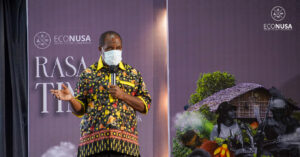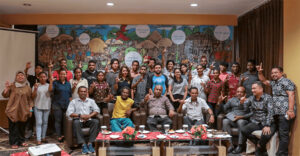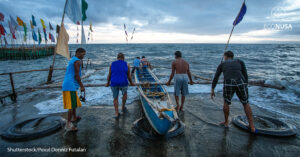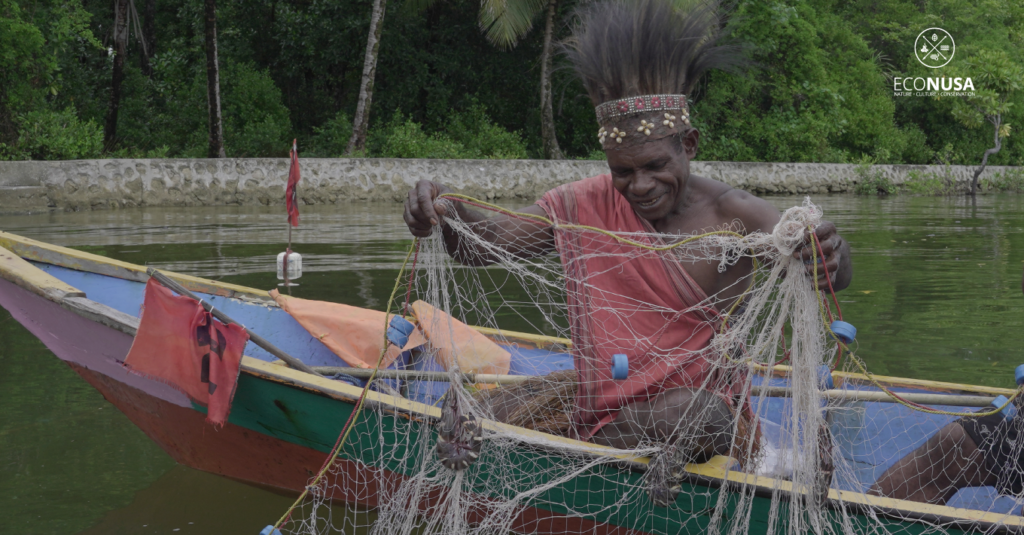
That morning in mid-June 2023 the sun finally appeared, a few days before the village was covered with a cloudy sky and heavy rain. Mama Ariance Habetan, one of the traditional elders of the Yaben tribe, together with several residents of Wamargege Village and Konda Village in South Sorong, Southwest Papua are preparing to perform a traditional ritual.
“This is a ceremony of the Yaben tribe to summon prawns,” said Mama Ariance Habetan. Until today, people still do this tradition that was passed down from their ancestors. Whenever the local fishermen have decreased prawn, they will perform the ritual in the sea to have their ancestors’ blessings so that they might increase their catch.
Read also: Egek Festival: A Traditional Way of Moi Tribe in Preserving its Heritage and Nature
Using two longboats, Mama Ariance and the community headed to the shrimp fishing location, in the waters next to the mangrove forest across from Konda Village. They wore traditional clothes of the Yaben tribe, carrying betel, areca nut, and cigarettes. Mama Arince sat in the front position in one of the boats.
When the boats arrived at the location, the ritual began. While standing, mama Ariance chanted incantations using the Yaben language calling for the ancestors, while washing away the offerings that were brought one by one into the seawater. The sound of the chant broke the silence, penetrating the thick cover of the surrounding mangrove forest. The village people on the boat joined in the chanting and whispered prayers to their ancestors. Hope their prawn catch will be abundant.
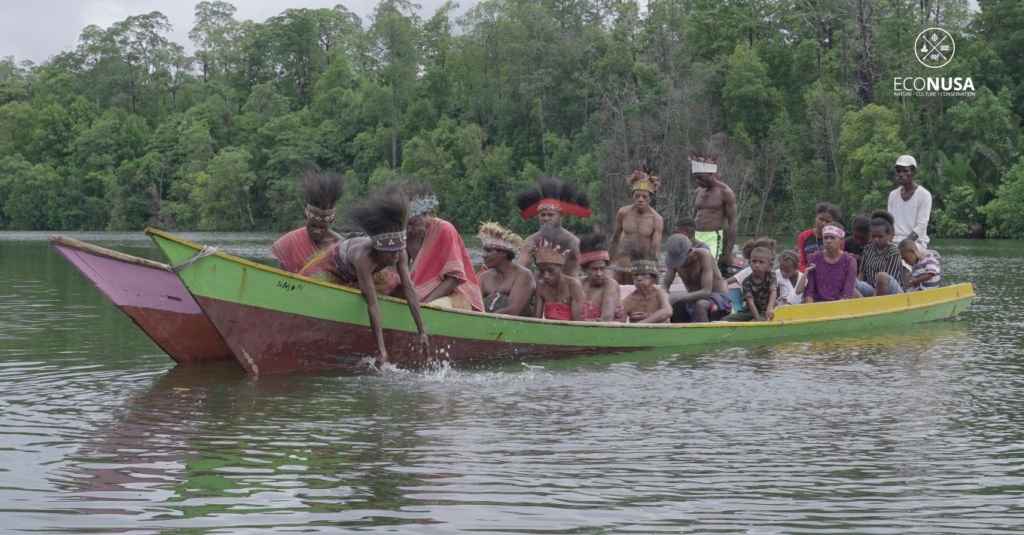
Most of the people in Konda Village and Wamargege Village are fishermen who depend on fisheries commodities, especially shrimp. “I usually go out to sea early in the morning to find prawns. If the weather is good, I can go home early and get up to 20 kilograms, but if it’s bad, I am only able to catch two or three kilograms of prawn,” said a local fisherman, Benyamin Kaspina, in Wamargege Village.
Read also: Handling Fishing Net of Hope in Segun Village
In Konda Village and Wamargege Village, local fishermen have been selling the prawns they catch to long-established local traders. Prior to heading out to sea, they typically obtain fuel for their boats, fishing gear such as nets, and other essentials like sugar, coffee, and cigarettes from creditors. Once they return home with their shrimp catch, they sell it to the traders, and their earnings are then used to meet their debt payment obligations. Unfortunately, it is not uncommon for them to return home without any income, as their catch may not be sufficient to cover the debt.
Seeing these conditions, the Fgan Fen Sisi Cooperative was established to support the people in the two villages. Taking its name that means “walking together” from the language of the Tehit tribe, which mostly inhabits the South Sorong area. Fgan Fen Sisi was built to accommodate and distribute potential commodities in Sorong Raya Regency, especially the villages in the Konda District, including the villages of Manelek, Nakna, Bariat, Konda, and Wamargege.
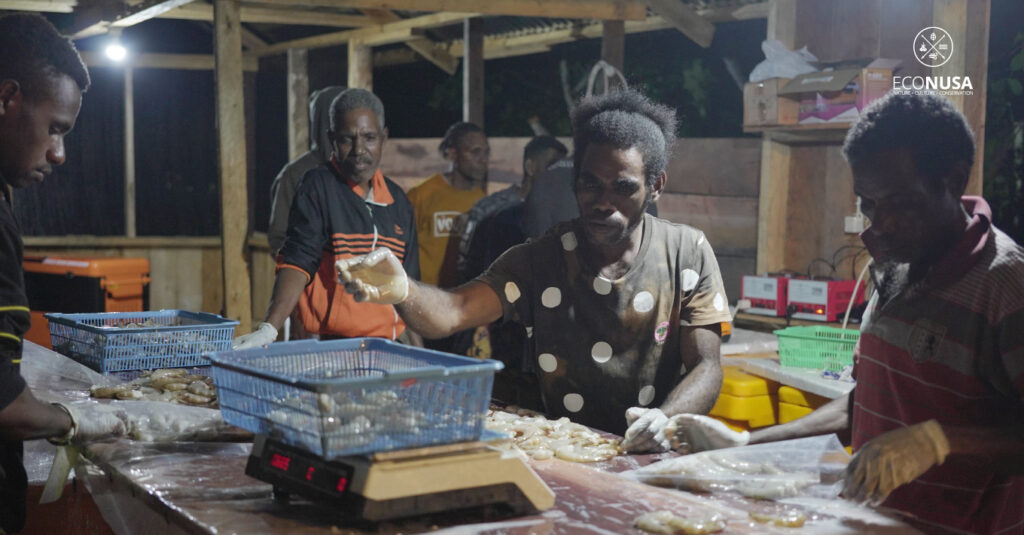
“Each village possesses unique potentials that are harnessed by its community. One of the primary objectives of this cooperative is to establish itself as a hub for these potential commodities, with prawns being one of them. Through collaboration with KOBUMI, we aim to identify markets that can readily absorb these commodities, thereby fostering economic growth and prosperity among the local populace,” stated Matheos Yacobus Rayar, the Chair of the Fgan Fen Sisi Cooperative.
Since early 2023, Fgan Fen Sisi has purchased hundreds of kilograms of prawns from the community and distributed them to KOBUMI. The shrimp are marketed to the capital city. After their prawns are brought to the cooperative, the community can earn their income immediately from the sale.
“Before there were cooperatives, we felt it was more difficult, because we were bound by obligations (debt) with the intermediaries here. But now we are glad that the cooperative is here. We can easily sell the prawns and are able to get immediate payment. The cooperative really helps us,” Benyamin said. He added, “I hope that in the future, cooperatives can help us, to further improve our economy and welfare.”
Read also: A Travel Note: Attending Molo, A Traditional Fishing Method of Moi Kelim Tribe
In April-May 2023, with the support of KOBUMI and EcoNusa, the cooperative established a prawn weighing facility. According to Matheos, the weighing facility not only functions as a place for weighing and storing prawn, but also provides for the needs of the community, especially fishermen, in Konda Village and Wamargege Village. The weighing house is also used as a discussion facility for local fishermen so they can increase their awareness and knowledge about the importance of protecting the sea and mangrove forests around the village.
Matheos said the Fgan Fen Sisi Cooperative would expand its business to 13 other villages in South Sorong Regency, namely Sawiat, Seremuk, Konda, Teminabuan and Kais Darat Districts. From the results of the EcoNusa assessment, these villages have potential commodities, such as sago, pineapple and crabs. In addition, the cooperative also plans to establish a savings system that aims to help fishermen manage their finances and encourage economic growth for the community in South Sorong.
Editor: Swinny Adestika


